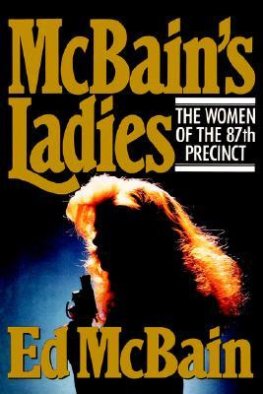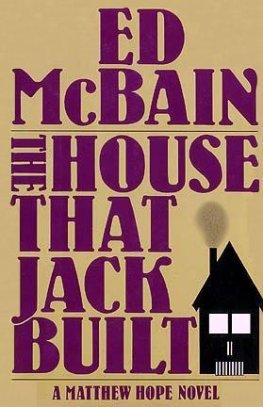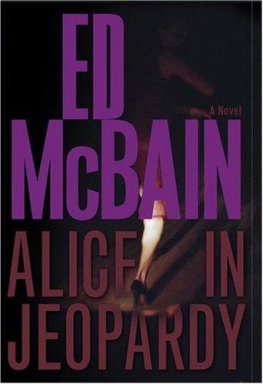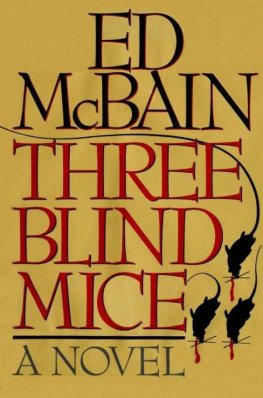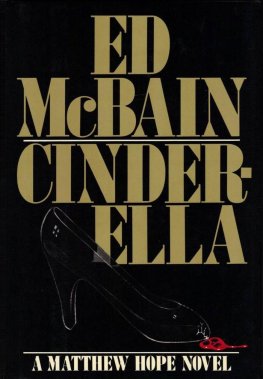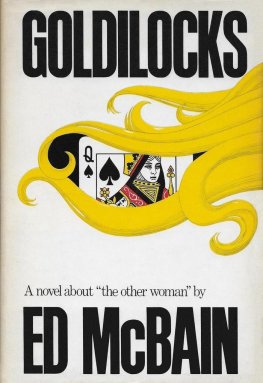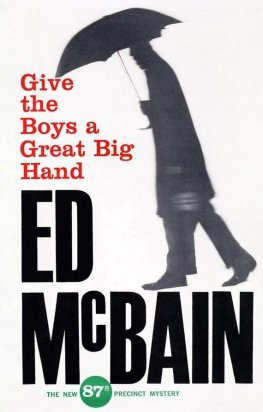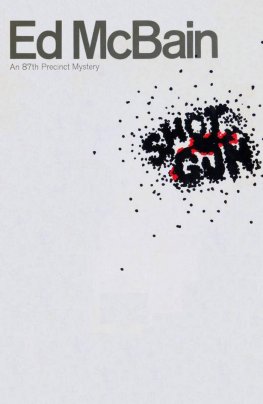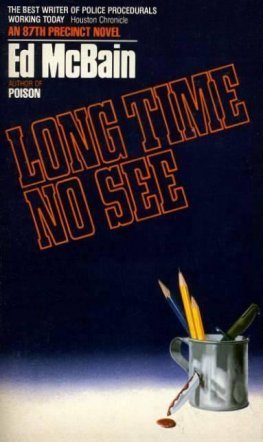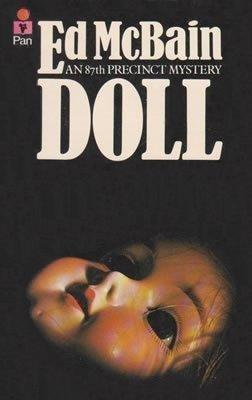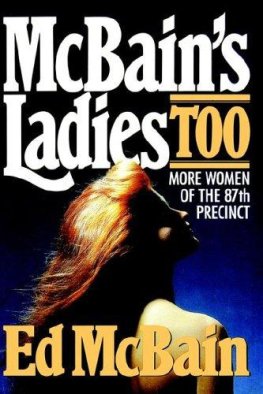"He had heart trouble," the woman was telling Carella.
Which perhaps accounted for the tiny pinpricks of
blood on the dead man's eyeballs. In cases of acute right-heart failure, you often found such hemorrhaging. The grayish-blue feet sticking out from under the edge of the blanket were another matter.
"Told me he hadn't been feeling good these past few
days," the woman was saying. "I kept telling him to go
see the doctor. Yeah, I'll go, I'll go, don't worry, like that, you know? So I stopped by this morning to see how he was, found him just this way. In bed. Dead."
"So you called the police," Meyer said, nodding.
Because he'd expected to go out on a narcotics plant
this morning, he was wearing blue jeans, a sweat shirt,
and Reeboks. Instead, he'd caught this one with Carella
and here he was. On a fishing expedition with a woman he
felt was lying. Burly and bald, he posed his question with
wide, blue-eyed innocence, just as if it did not conceal a
hand grenade.
"Yes," she said, "I called the police. That was the first thing I did."
"Knew straight off he was dead, is that right?"
"Well . . . yes. I could see he was dead."
"You didn't take his pulse or anything like that, did
you?" Carella asked.
Looking trimmer and fitter than he had in a long whilehe had deliberately lost six pounds since his fortieth birthdayhe was dressed casually this morning in dark blue trousers, a gray corduroy jacket, a plaid sports shirt and a dark blue knit tie. He had not anticipated this particular squeal at a little past ten in the morning. In fact, he had scheduled a ten-fifteen squadroom interview with a burglary victim. Instead, here he was, talking to a woman he, too, felt was lying.
"No," she said. "Well, yes. Well, not his pulse. But
I leaned over him. To see if he was still breathing. But I
could see he was dead. I mean . . . well, look at him."
The dead man was lying on his back, covered with
a blanket, his eyes and his mouth open, his tongue protruding. Carella glanced at him again, a faint look of sorrow and pain momentarily knifing his eyes. In these moments, he felt particularly vulnerable, wondering as he often did if he was perhaps unsuited to a job that brought him into frequent contact with death.
"So you called the police," Meyer said again.
"Yes. Told whoever answered the phone . . ."
"Was this you called? Or the precinct number
direct?"
". I don't know the precinct number. I don't live
around here."
"Told the operator you'd come into your father's apartment and found him dead, is that right?"
"Yes."
"What time was this, Miss?"
"A little after ten this morning. It's Mrs, by the way," she said almost apologetically.
Carella looked at his watch. It was now twenty minutes to eleven. He wondered where the medical examiner was. Couldn't touch anything in here till the
ME pronounced the victim dead. He wanted to see the rest
of the body. Wanted to see if the legs matched the feet.
"Mrs Robert Keating," the woman said. "Well, Cynthia
Keating, actually."
"And your father's name?" Meyer asked.
"Andrew. Andrew Hale."
Better to let Meyer stay with it for now, Carella thought. He had noticed the same things Carella had, was equally familiar with the telltale signs of a hanging, which this one resembled a great deal, but you couldn't hang yourself lying flat on your back in bed with no noose around your neck.
"How old was he, can you tell us?"
"Sixty-eight."
"And you say he had heart trouble?"
"Two heart attacks in the past eight years."
"Serious?"
"Oh yes."
"Bypasses?"
"No. Two angioplasties. But his condition was very
grave. He almost lost his life each time."
"And he continued having trouble, is that it?"
"Well . . . no."
"You said he had heart trouble."
"Two serious heart attacks in eight years, yes, that's heart trouble. But he wasn't restricted in his activities or
anything."
"Good morning, gentlemen," a voice said from the
bedroom doorway. For a moment, the detectives couldn't
tell whether the man standing there was Carl Blaney or Paul Blaney. Not very many people knew that Carl Blaney and Paul Blaney were twin brothers. Most of the detectives in this city had spoken to them separately, either on the phone or in person at the morgue, but they assumed the similarity of their surnames and the fact that they both worked for the Medical Examiner's
Office were attributable to mere coincidence. As every
working cop knew, coincidence was a major factor in
police work.
Both Blaneys were five feet, nine inches tall. Paul
Blaney weighed a hundred and eighty pounds, whereas his brother Carl weighed a hundred and sixty-five. Carl
still had all of his hair. Paul was going a bit bald at the
back of his head. Both Paul and Carl had violet eyes, although neither was related to Elizabeth Taylor.
"Carl," the man in the doorway said, clearing up any confusion at once. He was wearing a lightweight topcoat, a plaid muffler draped loose around his neck. He took off the coat and muffler and threw them over a straight-backed chair just inside the bedroom door.
"You are?" he asked Cynthia.
"His daughter," she said.
"I'm sorry for your trouble," he told her, managing to
sound as if he actually meant it. "I'd like to examine your father now," he said. "Would you mind stepping outside,
please?"
"Yes, of course," she said, and started for the door
way, and then stopped, and asked, "Shall I call my husband?"
"Might be a good idea," Carella said.
"He works nearby," she said to no one in particular
and then went out into the kitchen. They could hear her
dialing the wall phone there.
"What's it look like?" Blaney asked.
"Asphyxia," Carella said.
Blaney was already at the bed, leaning over the dead
man as if about to kiss him on the lips. He noticed the
eyes at once. "This what you mean?" he asked. "The petechiae?"
"Yes."
"By no means conclusive evidence of death by asphyxia," Blaney said flatly. "You should know that,
Detective. This how he was found? On his back this way?"
"According to the daughter."
"Couldn't have accidentally smothered then, could
he?"
"I guess not."
"You have any reason to disbelieve her?"
"Just the blood spots. And the blue feet."
"Oh? Do we have blue feet as well?" Blaney asked,
and looked toward the foot of the bed. "Are we suspecting
death by hanging then? Is that it?"
"The daughter says he had a history of heart disease,"
Carella said. "Maybe it was heart failure. Who knows?"
"Who knows indeed?" Blaney asked the dead man's
feet. "Let's see what else we've got here, shall we?" he
said, and threw back the blanket.
The dead man was wearing a white shirt open at the
throat, gray flannel trousers fastened with a black belt.
No shoes or socks.
"Goes to bed with all his clothes on, I see," Blaney
said dryly.
"Barefoot though," Carella said.
Blaney grunted, unbuttoned the shirt, and slid a stethoscope onto the dead man's chest, not expecting to find a heart beat, and not surprised when he didn't. He removed all the man's garmentshe was also wearing striped boxer shortsand noticed at once the grayish-blue coloration of the corpse's legs, forearms, and hands. "If he was hanged," he told Carella, "and I'm not saying he was, then it was in an upright position. And ;/ he was moved to the bed here, and I'm not saying he was, then it wasn't too soon after he died. Otherwise the postmortem lividity would have faded from the extremities and moved to the back and buttocks. Let's take a look," he said and rolled the dead man onto his side. His back was pale, his ass as white as a full moon.


